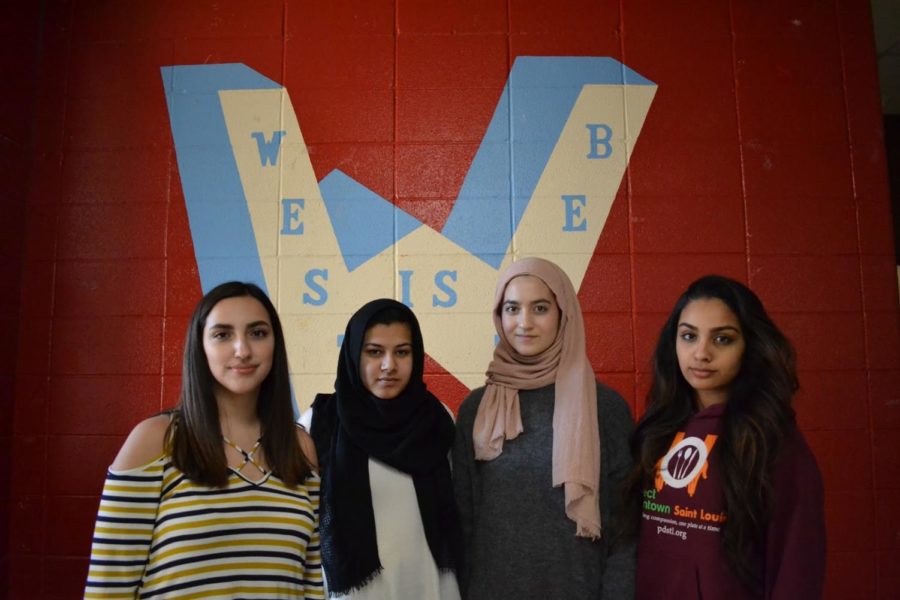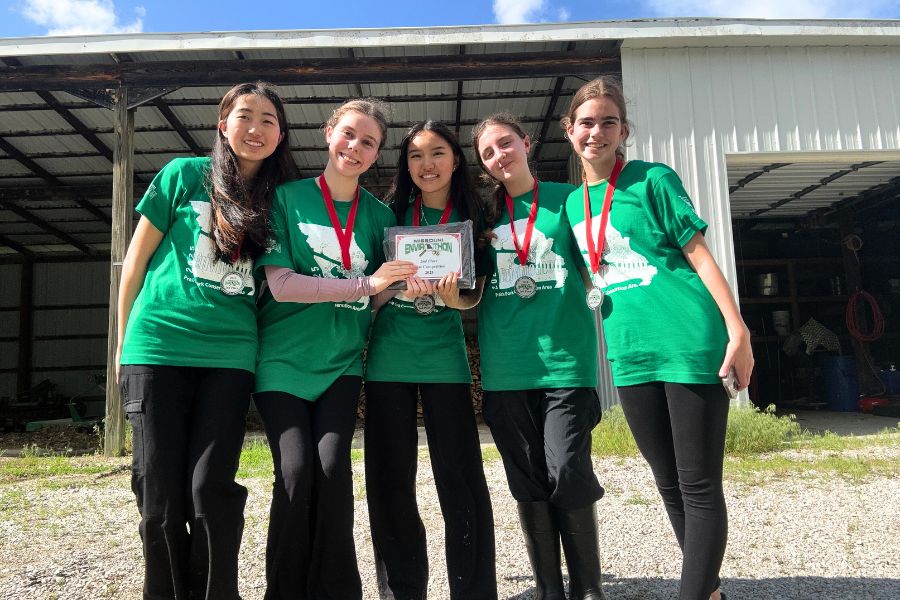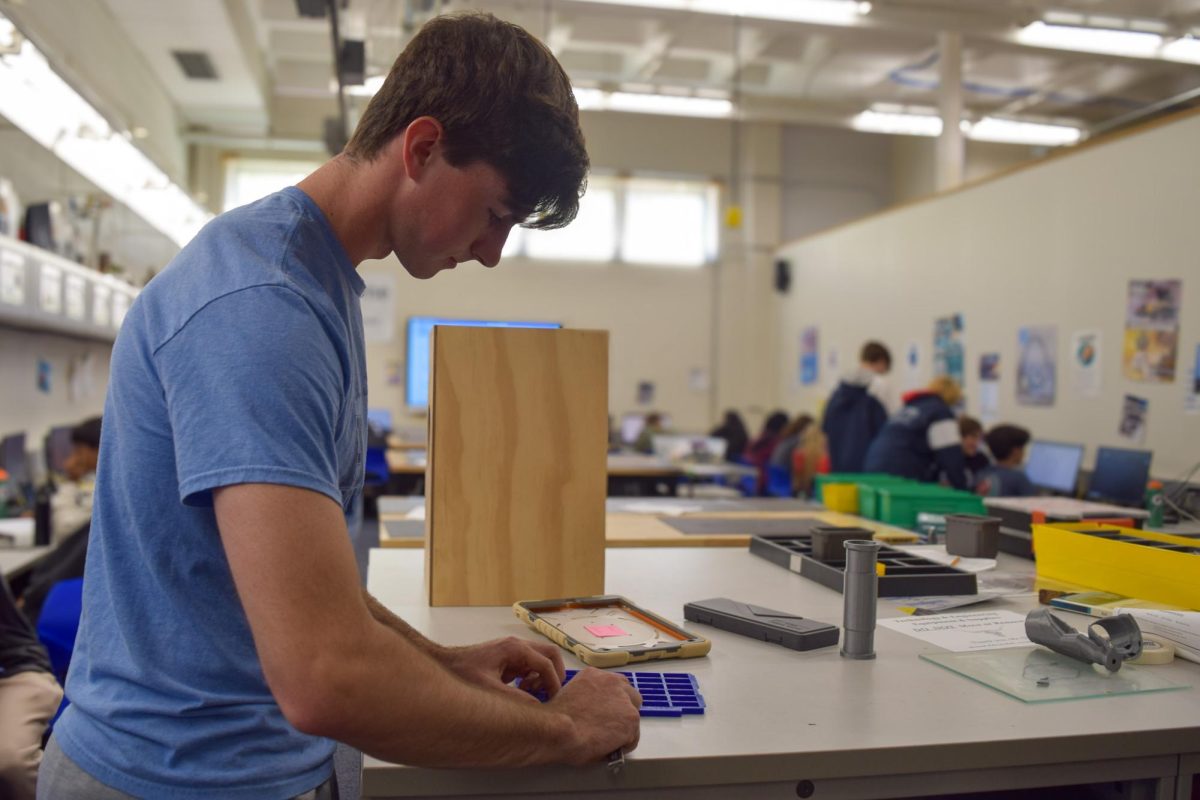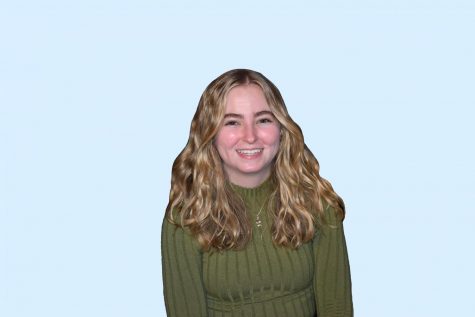While most students would groan at the thought of an English project, seniors Kinza Awais and Hira Khan used the opportunity to address a topic they care about by creating a video raising awareness about immigration through students’ personal stories.
“I wanted to do something I was really passionate about and something that really needs to be spoken about because nobody really knows what’s going on with immigration,” Awais said. “I think just by using people from our own communities and people that we see around the school, it made a better connection to the viewers and affected them way more than if it was someone that they didn’t know.”
Sophomores Ulaa Kuziez and Camila Angulo, Whitfield High School senior Sebastian Martinez, Awais and Khan appear in the video, sharing their stories about being an immigrant.
“Usually when we talk about immigration or refugees, we don’t always look at the human aspect of them. By creating this video, Kinza and Hira were trying to get the point across that these, too, are human beings, and they’re just like us,” Kuziez said. “I can also have friends and can also go places–I’m not just an immigrant.”
Current controversies surrounding immigration in America motivated Awais and Khan to pursue this topic for their video.
“When legislation like DACA being taken out happens, it makes me really upset because our country is literally built off of immigrants, and our community is filled with so much diversity,” Khan said. “I think it’s so important for all of us to really get involved with politics and know that without immigrants, our country really wouldn’t be itself.”
While each student values their identity as an immigrant, they also value the other aspects of their identity.
“My identity is important because it makes me who I am. Without it, I really wouldn’t be who I am,” Khan said. “I take my culture extremely important because it’s something everyone sees on a daily basis, not only my Pakistani culture, but also my American culture, whether through my clothes, my language, or other things. I am bilingual, and it’s something I want to pass down to my future kids, like ‘Hey, I was bilingual, so that’s something that you should cherish.’ It’s always been important to my family and myself.”
Often times, however, they must pay a price for their identities due to the stereotypes and discrimination that can come with them.
“I just feel like other people’s voices are prioritized over mine, and it seems like so many people just think it’s normal at this point,” Awais said. “When I first came to West, I used to wear the hijab. I know how it felt to wear a hijab in this school and not wear a hijab, and it’s two completely different worlds. It’s like you have to prove yourself when you’re wearing a hijab. Even without it, my skin color is obviously still a barrier for me at times.”
Khan feels that she is not discriminated against at school although she faces issues in public at times, especially when she is traveling.
“Traveling has become a huge problem as an immigrant, and it definitely does not matter where I’m going. I always get stopped; I always get ‘randomly’ checked,” Khan said. “That’s where it mainly affects me, like ‘Oh, you don’t look the same, or you weren’t born here, so we have to check you to make sure you’re not a terrorist.’”
What further frustrates Khan is seeing her friends and family affected by certain legislation and discrimination.
“It took my uncle about 15 to 16 years to actually get to America, and it totally makes sense with everything that’s happened like terrorist attacks, but I thought it was just really frustrating that it took him that long to get into the country,” Khan said. “He’s done nothing, and he has a clean slate–he’s just trying to get here to be with his family and get an education. Thankfully, he did get here, but it’s so depressing constantly seeing my friends and family having to deal with their family not being able to come here.”
However, these students do not let these barriers and challenges define them; in fact, Kuziez feels that her experiences helped shape her passion towards human rights and social justice.
“I think my experiences force me to take action and speak up,” Kuziez said. “Looking back, I got an opportunity to come to the United States to flee Syria’s War, and I want to do what I can to help others, as well as raise awareness about the issue.”
By creating this video, Khan and Awais hope they can change the way immigration is viewed in America.
“I hope that people open their minds to immigration, and that they are more welcoming to hear people’s stories and learning where they came from,” Khan said. “Just being more open to meeting other people and learning about other cultures and not jumping to the conclusion that they’re bad or that they have this negative connotation hanging over them. We just hope that people build a more positive mindset towards immigration.”




![Focused on providing exceptional service, sophomore Darsh Mahapatra carefully cleans the door of a customer’s car. Mahapatra has always believed his customers deserve nothing less than the best. “[If] they’re trusting us with their car and our service, then I am convinced that they deserve our 100 percent effort and beyond,” Mahapatra said.](https://pwestpathfinder.com/wp-content/uploads/2025/10/DSC_0018-1200x800.jpg)
![Sophomore Aleix Pi de Cabanyes Navarro (left) finishes up a soccer game while junior Ava Muench (right) warms up for cross country practice. The two came to Parkway West High School as exchange students for the 2025-2026 school year. “The goal for the [exchange] program is to provide opportunities for both Parkway students and our international exchange students to learn about other cultures, build connections and become confident, capable, curious and caring — Parkway’s Four C’s — in the process,” Exchange Program Lead Lauren Farrelly said.](https://pwestpathfinder.com/wp-content/uploads/2025/10/Feature-Photo-1200x800.png)

![Gazing across the stage, sophomore Alexis Monteleone performs in the school theater. The Monteleone family’s band “Monte and the Machine” has been releasing music since 2012, but Alexis started her own solo career in 2024 with the release of her first single, Crying Skies. “My whole family is very musical, [and I especially] love writing [songs with them],” Monteleone said.](https://pwestpathfinder.com/wp-content/uploads/2025/09/DSC7463-1200x798.jpg)
![Amid teaching a lesson to her AP Calculus BC class, Kristin Judd jokes alongside her students in their funny remarks. Judd has always enjoyed keeping the mood light in her classroom, along with on the volleyball court. “[I enjoy] that side talk where you see [or] overhear a conversation and chime in, or somebody says something funny,” Judd said.](https://pwestpathfinder.com/wp-content/uploads/2025/09/image-1200x730.jpg)
![Eyeing the ball, junior Ella McNeal poses for her commitment pictures at Clemson University. McNeal’s commitment comes after months of contact with top Division 1 soccer programs. “ It has taken a lot to get to where I am, but I know that [what] I've already been through is just the beginning, and I can't wait for what is to come,” McNeal said.](https://pwestpathfinder.com/wp-content/uploads/2025/09/IMG_4926-1200x900.jpeg)


![Senior Adam Zerega stands with senior Dexter Brooks by farm equipment. Zerega often worked with friends and family on his farm. “I've been able to go to my family's farm since I was born. I [spend] at least three weekends a month [on the farm], so I'm there all the time,” Zerega said.](https://pwestpathfinder.com/wp-content/uploads/2025/04/IMG_4872-1200x900.jpg)

